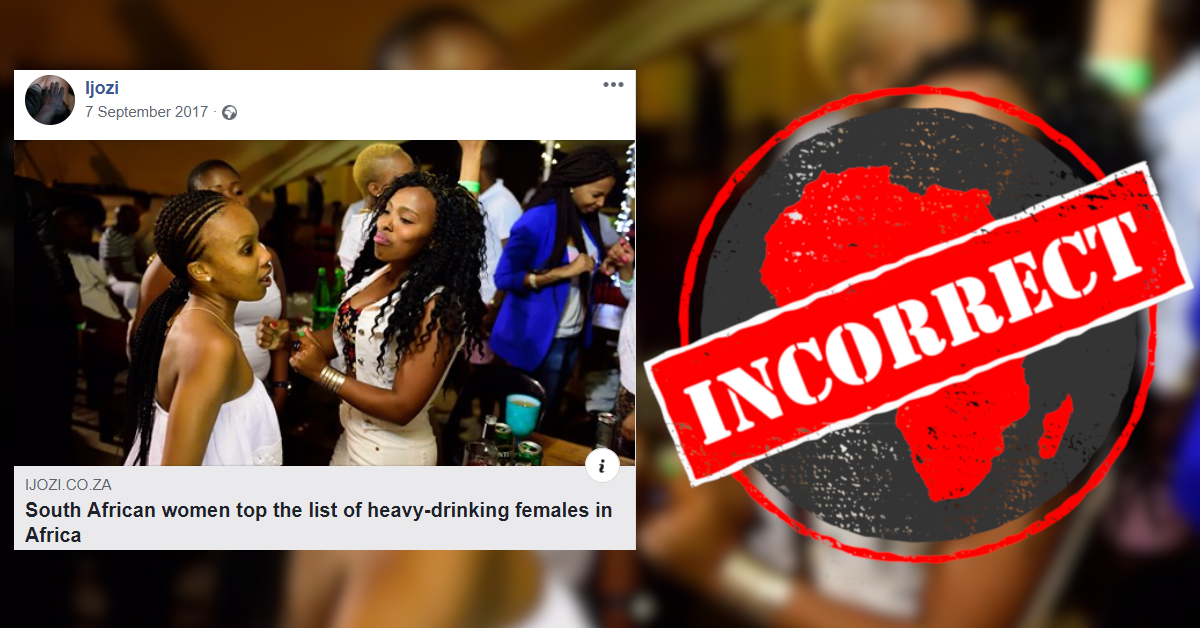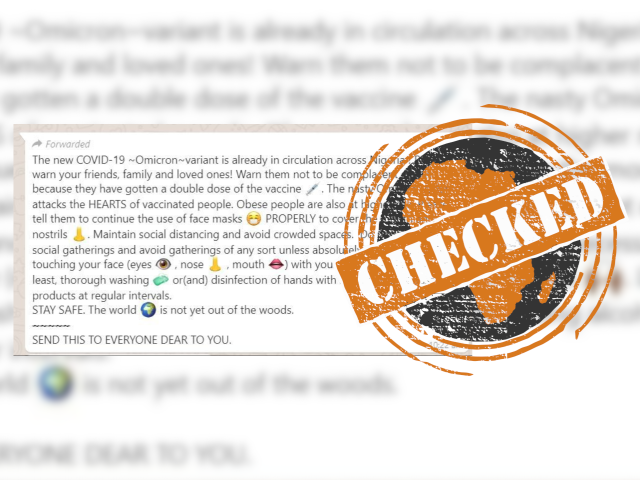An article published on the tabloid website iJozi in September 2017 claims “South African women top the list of heavy-drinking females in Africa” according to “a World Health Organisation report”.
It includes an old claim that “pregnant women in poor communities, particularly in the Eastern Cape, abused alcohol with the intention of harming the foetus so that they could claim higher social welfare payments”.
The article has been posted on the iJozi Facebook page several times since 2017. It was recently flagged as possibly false by the social network’s fact-checking system.

The article is a word for word copy of a TimesLive article published in 2014. At the time, Africa Check rated the article exaggerated. (Read our report here: “Media reports exaggerate the number of Zambian and SA women who binge drink”.)
We found that the claims came from a Washington Post article, not the World Health Organization. The Washington Post later issued a correction.
Both the iJozi and TimesLive articles include a quote by “lead researcher Jonathan Shepherd”.
Africa Check asked Professor Jonathan Shepherd, the focal person at the WHO Violence Prevention Alliance, about the claim that pregnant women drink to harm their unborn children.
“I am delighted to report that this claim is complete fiction,” he told us. “Neither I nor my research team have ever studied South African women. I am astonished that anyone should believe that we have.”
According to the WHO’s estimates of global alcohol consumption, South African women drank an average of 2.7 litres of pure alcohol in 2016.
But the 2016 estimates of consumption by women in a few other African countries are higher.
For both Nigeria and Gabon it’s 4.6 litres of pure alcohol, and for Equatorial Guinea it’s 4.7 litres.
Claims that pregnant South African women, “particularly in the Eastern Cape”, deliberately drink alcohol to harm their unborn children originated in a 2012 article by the Herald, a newspaper based in the Eastern Cape province. The claim was also picked up by UK news channel Sky TV. Both articles have since been deleted.
Africa Check debunked the claims in 2013, finding they were based on anecdotal evidence.
South Africa’s care dependency grant provides a monthly stipend to the main caregiver of a severely disabled child.
FASD is a range of disorders caused by drinking alcohol during pregnancy. It can lead to learning difficulties, growth deficiencies, speech problems and behavioural issues in children. The care dependency grant is only paid if a medical officer finds that the child has a permanent and severe medical disability.
According to research published in the Journal of the American Medical Association in 2017, South Africa has the highest prevalence of FASD cases in the world.
So there is evidence that many South African women drink alcohol during pregnancy. There is no evidence that they do it do harm their babies on purpose, and so claim a welfare cheque.
Africa Check could not locate any report, from the WHO or any other source, that contained evidence of South African women deliberately abusing alcohol during pregnancy in order to give birth to disabled babies and qualify for a social grant. - Africa Check
Further reading:
https://africacheck.org/reports/media-reports-grossly-exaggerate-percentage-of-zambian-and-south-african-women-who-binge-drink/
https://africacheck.org/reports/no-evidence-for-claim-women-drink-to-harm-babies-and-collect-benefit/
https://africacheck.org/factsheets/separating-myth-from-reality-a-guide-to-social-grants-in-south-africa/
It includes an old claim that “pregnant women in poor communities, particularly in the Eastern Cape, abused alcohol with the intention of harming the foetus so that they could claim higher social welfare payments”.
The article has been posted on the iJozi Facebook page several times since 2017. It was recently flagged as possibly false by the social network’s fact-checking system.

Copied from TimesLive article debunked in 2014
The article is a word for word copy of a TimesLive article published in 2014. At the time, Africa Check rated the article exaggerated. (Read our report here: “Media reports exaggerate the number of Zambian and SA women who binge drink”.)
We found that the claims came from a Washington Post article, not the World Health Organization. The Washington Post later issued a correction.
Both the iJozi and TimesLive articles include a quote by “lead researcher Jonathan Shepherd”.
Africa Check asked Professor Jonathan Shepherd, the focal person at the WHO Violence Prevention Alliance, about the claim that pregnant women drink to harm their unborn children.
“I am delighted to report that this claim is complete fiction,” he told us. “Neither I nor my research team have ever studied South African women. I am astonished that anyone should believe that we have.”
Not the heaviest drinkers in Africa
According to the WHO’s estimates of global alcohol consumption, South African women drank an average of 2.7 litres of pure alcohol in 2016.
But the 2016 estimates of consumption by women in a few other African countries are higher.
For both Nigeria and Gabon it’s 4.6 litres of pure alcohol, and for Equatorial Guinea it’s 4.7 litres.
Foetal alcohol disorders and care dependency grant
Claims that pregnant South African women, “particularly in the Eastern Cape”, deliberately drink alcohol to harm their unborn children originated in a 2012 article by the Herald, a newspaper based in the Eastern Cape province. The claim was also picked up by UK news channel Sky TV. Both articles have since been deleted.
Africa Check debunked the claims in 2013, finding they were based on anecdotal evidence.
South Africa’s care dependency grant provides a monthly stipend to the main caregiver of a severely disabled child.
FASD is a range of disorders caused by drinking alcohol during pregnancy. It can lead to learning difficulties, growth deficiencies, speech problems and behavioural issues in children. The care dependency grant is only paid if a medical officer finds that the child has a permanent and severe medical disability.
No research shows disorders caused deliberately
According to research published in the Journal of the American Medical Association in 2017, South Africa has the highest prevalence of FASD cases in the world.
So there is evidence that many South African women drink alcohol during pregnancy. There is no evidence that they do it do harm their babies on purpose, and so claim a welfare cheque.
Africa Check could not locate any report, from the WHO or any other source, that contained evidence of South African women deliberately abusing alcohol during pregnancy in order to give birth to disabled babies and qualify for a social grant. - Africa Check
| UPDATE: This report was updated to clarify that there is no evidence showing that South African women drink deliberately to harm their babies. |
Further reading:
https://africacheck.org/reports/media-reports-grossly-exaggerate-percentage-of-zambian-and-south-african-women-who-binge-drink/
https://africacheck.org/reports/no-evidence-for-claim-women-drink-to-harm-babies-and-collect-benefit/
https://africacheck.org/factsheets/separating-myth-from-reality-a-guide-to-social-grants-in-south-africa/
Republish our content for free
For publishers: what to do if your post is rated false
A fact-checker has rated your Facebook or Instagram post as “false”, “altered”, “partly false” or “missing context”. This could have serious consequences. What do you do?
Click on our guide for the steps you should follow.
Publishers guideAfrica Check teams up with Facebook
Africa Check is a partner in Meta's third-party fact-checking programme to help stop the spread of false information on social media.
The content we rate as “false” will be downgraded on Facebook and Instagram. This means fewer people will see it.
You can also help identify false information on Facebook. This guide explains how.





Add new comment